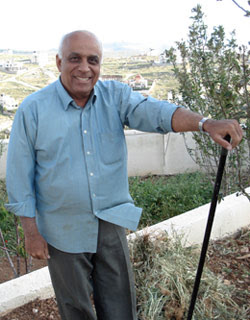
Marcy Newman, The Electronic Intifada, 27 November 2009
"Abdel Sattar Qassem, a professor and author of numerous publications on Palestinian history and Islamic thought, is well-known for his pungent critiques of Israel and the Palestinian Authority (PA). As a result he has been imprisoned by both the Israelis and the PA. Most recently his car was blown up as a warning from the PA. Marcy Newman spoke with Professor Qassem on behalf of The Electronic Intifada at his home in the Palestinian city of Nablus in the occupied West Bank.....
ASQ: ....In 1999 I wrote the "Statement of the Twenty." We had 20 prominent people in the West Bank and Gaza sign a petition in which we accused Arafat of being corrupt. I insisted on accusing Arafat in that statement because if we don't, none of us will go to jail. If we don't go to jail, nobody will hear about our statement. That was the price. Two of us were in prison for 40 days in Jericho, the others spent 15 days.
In 2005 they burned my car. In 2007 they shot around 60 [bullets] at my car. They arrested me in 2008 for one night. They burned my car in January 2009. The latest was that I spent three days in prison. I still have so much difficulty with the PA. But I cannot just stay silent while the PA rapes my land, my country and my people. They are collaborating with the Israelis. They are coordinating with them on security matters. They have been arresting Palestinians in defense of Israeli security......
MN: What about American imperialism? How does the dynamic of resistance change with US General Keith Dayton training PA forces?
ASQ: Now we have the American Dayton republic. Dayton is the High Commissioner of Palestine. He's in control. The United States spends so much money recruiting all of these Palestinians to serve Israeli security and American interests.
They are recruiting people who have a very narrow horizon. They just can receive and carry out orders. They depend on these kind of people. Some of them understand the situation, but they are under economic pressure. But so many of them do not understand. What alternative do I have to support these people financially? I cannot ask people to have their families starve for the principle of liberating Palestine. They will tell you, "Look, my family is much more important than Palestine." Would people like to starve or to be free? People like to fill their stomachs first. Afterwards they might think about freedom. So the Americans and the Europeans have been playing this game: keep the Palestinians always on the verge of starvation. Now they have a different situation where they feel they will starve to death if the Americans and Europeans do not give us money. Somebody like me will tell them, they will not let us starve because that will endanger Israeli security. They will allow outlets for us to bring money, food. This is not convincing because they cannot make the dialectical relationships. The Israelis in the first intifada decided to cut off the energy and gas for a couple of weeks. The international community started to protest against the situation: "What are you doing with these Palestinians?" There are several factors that we can play with. But to stand there and say, "If the Americans do not pay us money, we will starve," the conclusion is: we have to do what the Americans want."

No comments:
Post a Comment